Episode #160 - The mistress of Collinwood lies stiffly in her bed, hovering in the narrow world between life and death--unable to move, unable to communicate--a slow heartbeat and staring eyes the only indication that life still exists within her.
Liz' bedroom - Carolyn sits beside her unresponsive mother. Carolyn looks closely at her mother's face, hoping for a positive sign. Vicki enters. How is she? she asks. No change, reports Carolyn. I wish I could do something! says Vicki, frustrated. There isn't the slightest movement, says Carolyn--I've been watching her eyes--hoping to see a blink or anything, but there's absolutely nothing--I've never seen such stillness. I'll sit with her for a while, volunteers Vicki. Thanks, I'll be all right, Carolyn assures her. You've got to have some lunch, insists Vicki. I'm not hungry, says Carolyn. Please go downstairs and have something, pleads Vicki. I don't want to leave her, says Carolyn. Why not? asks Vicki--I'll be here, and if anything happens, I'll call you. Because I keep getting the feeling that she's trying to say something to me, says Carolyn--I just feel it--Mother, are you trying to say something to me? asks Carolyn--Mother?--what are you trying to say? But the answer is locked in Liz' unmoving body.
Speak to me, begs Carolyn, please! She can't hear you, says Vicki. She can, says Carolyn, I'm sure of it. You can't be sure, says Vicki--don't do this to yourself. Carolyn rises and asks why the doctor can't do anything. He's done everything he could do here, says Vicki, that's why he wants to take her to a hospital, so they can do a more thorough testing. Let them bring the hospital equipment here, insists Carolyn (nice to have big bucks and power). That's impossible, says Vicki. My mother doesn't want to be moved, insists Carolyn. I know, says Vicki gently, it's not a question of that now, there's no choice. I promised her, says Carolyn. If your mother had known how sick she was, she'd have consented to being moved, says Vicki. I know my mother, she wouldn't leave this house under any circumstances, says Carolyn, and I don't intend to take the word of one doctor, I want the opinion of specialist, one of them is bound to know what's wrong with her. There is a doctor coming here soon, says Vicki. I didn't know that, says Carolyn. I meant to tell you sooner, says Vicki. Who is he? asks Carolyn. A Dr. Guthrie, Frank contacted him, says Vicki. What does he specialize in? asks Carolyn. I don't know exactly, says Vicki (why is she lying?) but Frank thinks it would be very helpful if he takes a look at your mother. I don't care who looks at her, says Carolyn, as long as they can help her--I just want her to get well. I'll be downstairs if you need me, says Vicki, and leaves. Carolyn sits beside her mother, watching hopefully for signs of movement. Roger enters and asks how Liz is. The same, says Carolyn. Yes, she is, agrees Roger--as long as she's not worse. Of course, she only seems the same, says Carolyn, she might be getting worse. If she's getting worse, this is no place for her to be, says Roger. It's where she wants to be, insists Carolyn. Oh, Kitten, where one wants to be and has to be are two different places--your mother should be in the hospital, he insists. We've been through all this, Carolyn reminds him--it's her wish that she be treated here, and I intend to see her wishes are carried out. One thing about your mother, says Roger, she never did know what's best for her, and if something isn't done soon... If you don't mind, says Carolyn. You know, you're very much like your mother, incredibly stubborn to the point of being reckless, he notes. I noticed you weren't terribly satisfied with the doctor's lack of diagnosis, says Carolyn. At least he had the sense to recommend sending her to a place where an accurate diagnosis is greater, replies Roger--I give him credit for that much. But isn't it possible that a specialist might diagnose something that wouldn't require sending her to a hospital? Asks Carolyn. It's possible but not very likely, he says--I think any proper diagnosis is going to result from your mother being sent to a hospital. It's what she wants, and that's the way it's going to be, says Carolyn, crossing her arms over her chest. You sound very important and official, says Roger, I think I should remind you that your mother is my sister, and my concern for her is at least as great as yours. I'm sure it is, says Carolyn. And it is my considered opinion, be continues, that she be hospitalized, and I urge you to do something about it right away. You know where I stand, she says. Very well, he says, if you don't give permission, I certainly shall. YOU don't have the authority, says Carolyn. Oh don't I? he asks--we'll see about that--you have quite a ways to go before you become the mistress of this house--I think I will have a talk with Garner and find out exactly that areas you're in charge of--and the limits to it. (sounds like war) Carolyn whirls around, furious--I wish you would do that, she says, I think it's about you found out what those limits are--I'm sure it will enlighten you! He grins. You're getting more and more like me every day, he says. Surely that's a compliment, she says. Surely, he replies sarcastically
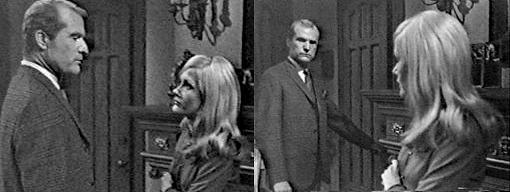
--I hope you'll reconsider. Frank Garner is sending someone in to see her today, she says--if we're still able to talk, I'll let you know after he examines her. Good, says Roger, looking at Liz; he leaves the room. Carolyn stands there, then goes to her mother and speaks to her. Something tells me whatever is wrong with you can't be cured in a hospital, Carolyn tells her mother. Liz lies there, unblinking.
Vicki answers the doctor. It's Dr. Guthrie, and Vicki invites him in. He slips off his coat. We've been expecting you, she tells him, taking his coat and hat. Frank Garner suggested I talk to you privately before I examine the patient, says Guthrie. Of course, says Vicki, placing his things on the foyer table--we can talk in here. They go into the drawing room. I must tell you, he says, I don't like being secretive like this. I understand that, she says, but Frank did explain the circumstances, didn't he? Yes, he did, says Guthrie, which intrigued me enough to come. I'm very glad you did, says Vicki, please sit down. They sit on opposite ends of the sofa. Do you understand the kind of work I do? he asks. Parapsychology, she says, it has to do with extra sensory perception. Yes, that's right, except I go further than that, he says, to investigate other psychic phenomenon, such as reports of the supernatural--we have a research lab at the college. Frank's told me, says Vicki, and he says if anyone can be of help, it's you.
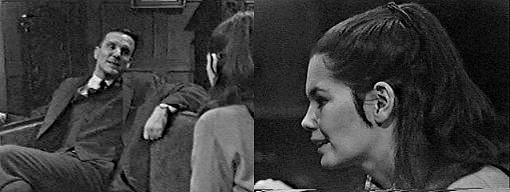
He's a flatterer, says Guthrie, unfortunately, we're unable to give explanations for many of the so-called phenomena that we're called upon to research--many of these reports are false or pure hallucination, even though they seem to come from people of very good background. Did Frank give you enough to go on? asks Vicki. For a start, yes, says Guthrie, but in the interests of science, I'll have to use my own methods--I'll compile as much data as I can, then try to make an evaluation--I may come up with something, or again, like in so many cases, nothing. So many things have happened here, says Vicki, that's very hard to know what's real and what's not. If I can do my job, that's exactly what I'll tell you, he promises. Have you ever seen a... begins Vicki. A ghost?--no, I've never had the pleasure, he replies. Do you believe in them? she asks. I've been very close to finding that out, he says, over the past few years, I've assembled enough evidence to support the theory they never do exist, but never, unfortunately, the kind of concrete proof to prove it to me personally. Are you a skeptic? she asks. No, he says, that's just an attitude, a role that I'm forced to play so I can evaluate the evidence more fairly--I'm afraid otherwise I might start believing everything I'm told. The things that have happened here are very hard to believe, says Vicki. (why doesn't she mention the ghosts she has seen?) I'll find an answer, he says, some kind of answer. How shall I present you to the others? she asks. Quite truthfully as a psychologist, he says. But if they ask what you specialist in? she asks. The psychosomatic, he says, you can tell them that it's quite possible her illness is caused by something on her mind--and that might be closer to the truth than you think. Vicki agrees. The doctor couldn't find anything wrong with her, she explains, but he wants to examine her more thoroughly. He should, of course, says Guthrie, but I'd like to see her now. Certainly, says Vicki. She leads Guthrie into the foyer, where they meet Roger coming downstairs. Oh, Roger, she says, the doctor's here. Oh, what doctor is this? asks Roger. Dr. Guthrie, says Vicki. The two men shake hands. How do you do? asks Roger. Very glad to meet you, says Guthrie--Frank Garner suggested I drop by on this case. That was very kind of him; I hope you can do something for my sister, says Roger. I hope so, too, says Guthrie. I should be glad to have an outside opinion, says Roger, our family doctor claims he's never seen anything like this in all his experience--I certainly hope you don't come away with the same comment. From what I've heard, I well might, says Guthrie. I shall be very disappointed in you if you do, says Roger--however, Doctor, if your findings are similar, I hope you will persuade my niece that her mother should be sent to a hospital.
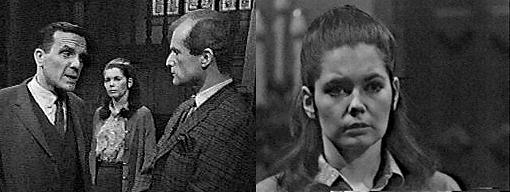
If what I suspect is true, says Guthrie, the patient will not spend another moment in this house. Roger and Vicki both look at him, astonished.
Carolyn, sitting with Liz, turns away, swallowing a lump in her throat. Vicki leads Guthrie in and introduces him to Carolyn. I understand Frank Garner called you in, says Carolyn. Yes, I've known Frank for several years, says Guthrie. You're a specialist? she asks. Yes, in psychosomatic disturbances, he says. Psychosomatic--you mean you think my mother's illness might be mental? she asks.
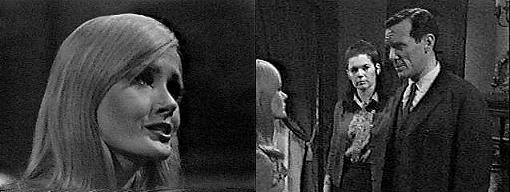
Only from what I've been told, he says, it's possible her illness was induced psychologically. What makes you think that? asks Carolyn. I spoke to her physician this morning, the man who examined her, explains Guthrie, and I listened to his impression--her physical condition seems so good, I thought I'd look into the psychological essential. At this point, I'm willing to try anything, says Carolyn. May I examine her? he asks. Since it happened, says Carolyn--she was talking, and seemed to have all her senses, then, without warning, I found her like this. She was alone when she went into this state, he says. I'm quite certain, says Carolyn. He checks her fingers and asks how long her hands have been like this. They were this way when I found her, says Carolyn. I see, he says, then takes out a pad and pen and begins to write. Can you remember what she was talking about when you last spoke to her? he asks. Yes, says Carolyn, she was asking to see her lawyer, putting me in charge of things. Essentially, then, he says, she was anxious. Very, says Carolyn. She was particularly anxious about her nephew, says Vicki--she wanted me to keep his mother away from him. Yes, Frank filled me in on that, says Guthrie--the relationship of Mrs. Collins to her son--what was the relationship of Mrs. Stoddard to Mrs. Collins? It wasn't a very good one, obviously, says Carolyn. Was there anything else significant about her state of mind? asks Guthrie. Yes, says Vicki, she acted as if she'd forgotten something--that she'd done something or gone somewhere. In other words, an unexplained lapse of time, says the doctor. Exactly, agrees Vicki--she had the feeling that she'd gone out of the house and come back from wherever she'd been. My mother seldom left the house and never the property, explains Carolyn as Guthrie writes in his notebook. She must have had a memory block, then, he says. I guess so, says Carolyn, she said she went out the front door, then came in--a short time after that, she collapsed--what does it mean? On the surface, he explains, it could mean a very common occurrence--a reaction to trauma--I'm suggesting she had an emotional experience of such intensity--something shocking or frightening--that gave her nervous system a delayed reaction--just as when you step off the curb in front of an oncoming automobile, and the car narrowly misses you, you jump back, then continue to cross the street--when you get to the other side, you start to shake. What sort of an experience could she have had? asks Vicki. I don't know, he admits, whatever it was--he looks at Liz--it was deep enough to block it right out of her mind. How can you be sure of this? asks Carolyn. I can't be sure, he admits, I can only go by what's given me--would you close the curtains, please? Vicki drops the drapes, darkening the room. Guthrie speaks to Liz: Mrs. Stoddard, can you hear me? The girls watch anxiously. He claps his hands in front of her face--no reaction. He lifts her arm and hits her elbow with a hammer--nothing. He takes a light from his pocket and shines it into her eyes. She doesn't even blink. What's the matter? asks Carolyn. Miss Stoddard, your mother is in a trance, says Guthrie, shocking both woman.
A trance? asks Carolyn. What do you mean? asks Vicki. I mean your mother is in a state of suspended animation, he says--she's in a condition that could have been induced by hypnosis. How could that be? asks Vicki. If we knew that, he says, we wouldn't have a problem here. Are you sure? asks Carolyn. Quite sure, he says, she's in a very deep state. What should we do? asks Vicki. The first thing we should do is get her out of this house, he says. Carolyn turns away--I can't, she says--she didn't want to be moved--she's depending on me to carry out her wishes. Her wishes are of no consideration now, he says--it's essential that she be moved out of here. Why? demands Carolyn. Because the influence--whatever it is that caused the trance--may be present here in the house, he says--your mother was placed in a deep trance by some unknown influence--now we have no idea how long the influence will hold this trance over her--if, indeed, it plans to let her go. What is this influence? asks Carolyn. I don't know as yet, he says, but the trance may be permanent. What do you mean? asks Carolyn. I mean your mother stands a very good chance of never coming back to consciousness, he says. This distresses Carolyn. Oh no! she wails. We've got to give her every possible chance, he insists. What can we do? she asks. The first thing we can do is remove her from the influence, he suggests, to take her as far away from harm as possible--I'm talking about life and death. What shall I do? Carolyn asks Vicki. Your mother didn't realize what was happening, says Vicki, you have no alternative. No, agrees Carolyn, I suppose not--all right, she tells Guthrie, you have my permission to move her. Good, says Guthrie. I'll call the doctor and make all the necessary arrangements, volunteers Vicki. If you will, Guthrie asks her, not a word about this spoken to anybody--do you understand? Of course, says Vicki. And find out the name of the hospital to which she's to be sent, says Guthrie, so I can have an associate of mine look after her? I will, says Vicki. Why do you insist on the secrecy? asks Carolyn after Vicki has left. Because the fewer people who suspect what we know, he says, the easier it will be to gather information--I would like to stay in Collinwood, meet everyone and see what information I can find--I think I can be a help to your mother. Carolyn goes to Liz. Can she hear us? she asks him. No, he says. Her eyes, do they see us? he asks. He waves a hand over her face; Liz doesn't blink.
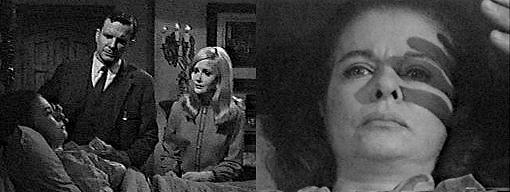
Her eyes seem only the nameless terror which made he this way, he says.
NOTES: I always liked Guthrie, who seemed so cool and together. He's so SMART! The actor playing him reminds me of Roy Scheider, and I like him, too. Something about intelligent men who use big words always appealed to me. And a parapsychologist! I'd never heard of such a thing, and was fascinated. What a cool job, investigating ghosts and such. They need him full time at Collinwood!
He agrees that Liz must be sent away from the influence, and that sounds right. But in her trance-like state, is it true she can't hear or see anything? Current theories don't go along with that concept.
Poor Carolyn seems so lost and unsure of herself, and Roger doesn't help. He wants what's best for his sister, of course, but is there an ulterior motive behind his wanting to get Liz out of Collinwood? Does he hope to speed up Laura getting custody of David?
Interesting camera shot in Liz' room--we see Carolyn and Vicki in two parts of a three-way mirror and Liz reflected in the other. It was interesting in light of their conflict about sending Liz away from Collinwood.
I believe Joan Bennett goes off to do a play for quite a while, which is why Liz is shipped off to a hospital and won't be seen for a long time. Too bad--the fight between her and Laura would have been fun to watch.
Episode #161 - The removal to a hospital of a woman with a mysterious ailment has caused a great deal of consternation to a great many people at Collinwood, especially one young woman who feels the heavy weight of new responsibilities.
Carolyn sits at the kitchen table, deep in thought, worried. You have to eat something, urges Vicki. What? asks Carolyn, who puts her napkin on her lap and looks at her plate of food. Nothing's going to be solved it you get sick, too, warns Vicki. I can't help it, I'm so worried! says Carolyn. We've just got to trust Dr. Guthrie, says Vicki. I do, says Carolyn, it's just that... I know, says Vicki, I'm very fond of your mother, too--she's been so good to me. The last thing she said to me was not to let them take her out of this house! laments Carolyn. You had no choice, Vicki assures her. I shouldn't have let them take her to the hospital, no matter what anyone says, I shouldn't have let them, says Carolyn, I should have listened to her last request. But the doctor said she was in danger here, says Vicki. Why? asks Carolyn--what's going on in this house? That's what he's here to find out, says Vicki. Whatever it is, says Carolyn, I don't think it will stop at the door--I think it will follow my mother wherever she goes
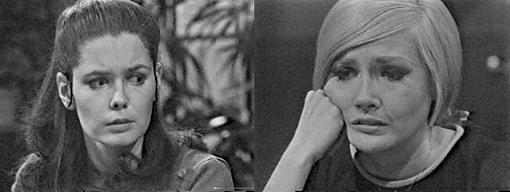
--I have this feeling I'm never going to see my mother alive again.
You're letting your imagination get the better of you, says Vicki. My mother's condition is not my imagination, insists Carolyn, it's real--if it gets worse, if she should die, how will I face myself? She is not gong to die, says Vicki, because physically, she's in perfect condition. How can you say that--she won't die? asks Carolyn, throwing her napkin on the table and going to the window--she might--and then how will I forgive myself?--I won't have given her the one thing she really wanted--to stay here--it would have all been so pointless. You've got to look at the positive side, says Vicki. There is no positive side, says Carolyn. I think you're being unnecessarily gloomy, says Vicki. Sometimes I wish we'd just close up this house and get away from this town, says Carolyn--I get so tired of being a Collins of Collinsport--look at my mother--she married my father, a Stoddard--but she never stopped being a Collins--now I can't, either--she's left it all to me--I don't want it! Stop it, please, begs Vicki, going to her. I'm sorry, I'm all right, says Carolyn. We really are a pair of sad sacks, jokes Vicki. I don't know what I'd do without you around, says Carolyn, thanks again. Dr. Guthrie enters and remarks that it's nice to start the day with two such pretty smiles. That's us, all smiles, dimples and laughs, says Carolyn--would you sit down? Thank you, he says. May I get you something? she asks. A cup of coffee would go very well, he says, sitting down. Vicki sits at the table, too. While pouring coffee, Carolyn asks if he's discovered anything yet. No, not yet, he says, but these things take a little time. He drinks his coffee black. I suppose, says Carolyn, it's so mystifying. I want you to be sure of one thing, he tells them--there's a scientific explanation for everything. What do you intend to do? asks Carolyn. The physical part of your mother's examination has been completed, he says, now I'll examine the psychic part, the part that relates only to her mind--you see, in parapsychology, we deal with ESP, the psychic contact between parties known and unknown--by testing, we found that ESP is actually part of the human experience--the uncharted areas of the mind. What does all this have to do with my mother? asks Carolyn. I believe your mother has had a psychic contact of some sort, Guthrie says. There's no doubt in your mind about this? asks Vicki. She's in a psychic trance, he explains--why, I don't know yet--but it seems to me there's something in the atmosphere in this house that threatens to harm her--what it is, I don't know, but that's why it was necessary , for her own safety, to have her moved away from here. What could it be? asks Carolyn--what could want to harm my mother? That's just what I hope to find out, he says.
Roger, wearing a turtleneck, walks across the landing and downstairs. When Carolyn exits the kitchen, he tells her he wants to talk to her. I have a million things to do, she says. Make that a million and one, he says, talking to me is the first thing on your list. Can't it wait? she asks. If it could wait, he says, I wouldn't be so insistent. Very well, she says. Let's go into the drawing room, he suggests--it's too public here, everyone acting as though they have nothing better to do than come and go. It is the front hall, she reminds him. So it is, and very drafty, he says--all the more reason for coming in here. All right, she says, dropping papers on the desk, what is it you want? I want to know what's going on around here, he says. I don't know what you're talking about, she says, there's nothing out of the ordinary happening in this house. (huh?) She sits at the desk and he sits beside her. I like you, he says, I really do, now that your mother is gone, you're the only opponent worthy of me. Flattery will get you no where, she says--what do you want? I've always said New England lost the art of conversation, he says, everybody's in a hurry to get to the point--very well, I want to know why you've changed your mind about your mother. (I thought he was for it?) In reference to what? she asks. You know perfectly well what, he says, you were absolutely adamant in your opposition to your mother moving out of this house--why the sudden change of heart? The doctor convinced me that he needed to run some tests that could only be made in the hospital, says Carolyn. What doctor? asks Roger. The doctor I consulted, of course, she says. Dr. Guthrie? he asks. Yes, she says. By the way, what is he a doctor of? asks Roger. Why? she asks. I simply want to get to the bottom of it, that's why, he says. Get to the bottom of what? she asks--there's no mystery here! Then tell me about Dr. Guthrie, he says. There's nothing to tell, she assures her uncle. What's he doing around here? demands Roger. Why don't you ask him? Carolyn suggests. At the moment, says Roger, I'm asking you--I'll get to him later. All I can tell you is that I think it was very kind of him to see Mother, says Carolyn. But Liz is no longer here, Roger reminds her, how can he help her if she's no longer here? I'm not bright enough for your riddles, she says. Don't be modest, my dear, he says, now come on, what about Guthrie? (I should think Roger would be thrilled, considering he wanted Liz to leave and because of Guthrie, Carolyn was convinced.) I've told you all I know, insists Carolyn. I think not, says Roger. I'm sorry, she replies, there's nothing I can do about what you think. Why is he so curious about your mother's state of mind? asks Roger. I don't see anything unusual in a doctor's being curious about a patient's state of mind just before being stricken by a mysterious ailment, she says. She starts to leave. It's the way in which he asks about it, says Roger--I don't like it. Well, says Carolyn, perhaps he saves his charming bedside manner for people who are sick. Now you're simply being evasive, he says. I don't mean to be, she says, I'm simply telling you what I know. There's still something you're holding back, accuses Roger, and I'm waiting for you to tell me what it is--I don't want that man prowling around in this house! Dr. Guthrie is here at my request, says Carolyn. Then it shall be MY request that he leave, say Roger. Don't force me to say something I don't want to say, cautions Carolyn. That is exactly what I want you to do, says Roger--we have a clear-cut issue--Dr. Guthrie--we are both pulling in opposite directions; obviously, I'm stronger! As usual, you've chosen the wrong time to draw battle lines, says Carolyn--I don't want to fight with you--I don't have to
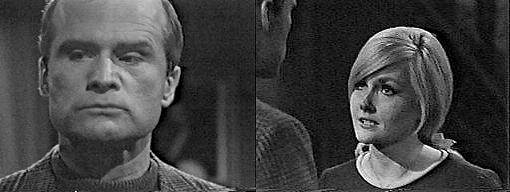
--if I want Dr. Guthrie here, he'll stay as long as is necessary. Roger glares at his niece.
Vicki and Guthrie sit at the kitchen table while he sips his coffee. Poor Carolyn, remarks Vicki, she's taking this so hard. It's only natural, he says--Mrs. Stoddard's her mother--seeing a normally healthy woman in that condition can be very upsetting. It's more than that, reveals Vicki--Mrs. Stoddard was adamant about not being moved out of Collinwood--in fact, it was her last request to Carolyn. In light of what her doctor told her, why do you suppose she felt that way? he asks. I think it had something to do with David and Mrs. Collins, Vicki tells him--Mrs. Collins had come back here after a long absence to get a divorce and custody of David--Mrs. Stoddard was very much against the idea, and she was afraid that if she was out of the way, Mr. Collins might let her have David. Why would she be so opposed to that? he asks. First of all, because of David, says Vicki--you see, he's the last of the Collinses, and the heir to all this--and then there's something else...now this just might be my imagination. Let me be the judge of that, he advises--please tell me about it. First of all, she begins, I think I should explain that David is not like other children--he's different--all of the extraordinary things that have happened here seem to center around him--I don't know if he seeks them out or they seek him. What extraordinary things? asks Guthrie--please, this may be important, try to be concise. There's an old house on the property, she says, David likes to play there. Any children like old houses, points out Guthrie, they lend themselves to make-believe. This is a special old house, says Vicki--it's haunted. For somebody in my field, that's a pretty large claim, he says with a grin. Believe me, it's not made lightly, she says. Is it, shall we say, generally haunted, or is there a specific ghost? he asks. A specific ghost, she says. A malevolent spirit that frightens the boy? he asks. No, she's very friendly, says Vicki, in a way, I think she watches over him. Does anybody know who she is? he asks. Yes, she's Josette Collins, an ancestor of the Collins family, says Vicki--there's a portrait of her in the Old House. Has anybody been present with the boy when she's materialized? He asks. No, says Vicki, you see she only appears to one person at a time. I hope you'll forgive me for doubting, he says, in my line, one has to, but it could be simply the fantasy of an imaginary child. No, he described her quite accurately, she says. There's the portrait, he says. I know that Josette is there, insists Vicki. You have great faith in your charge, he says, that's admirable, but still and all... That's not why I know she's there, says Vicki
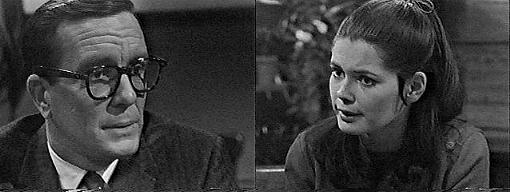
--I've seen her myself. Guthrie surveys her with incredulity.
Drawing room - I think the time has come for me to tell you exactly where you stand, says Carolyn. I think my dear nice is about to deliver a speech, says Roger, frowning. A brief one, and to the point, she says--the reason Dr. Guthrie will stay on here, despite your rumblings. Crossing his arms over his chest, Roger tells her he should be very glad to hear it. My mother is in a hospital bed in Boston, begins Carolyn, right now, she's the most important thing in the world to me--she's placed a very heavy burden on me--she's left the entire responsibility of the entire Collins family to me--not to you. And now you are drunk with power? he asks. No, this is what she planned in case anything happened to her, says Carolyn, and I intend to see it through. How do you intend to force whatever little policies you devise? he asks. (nasty!) Mother left a specific document with the attorneys, says Carolyn, that will advise and support me whenever necessary--please, Uncle Roger, don't make it necessary. I see, he says--and exactly where does that leave me? Life won't change for you, she assures him, you'll continue to be what you've always been--I don't want to fight with you, but you must respect my wishes when it comes to the running of this house!--she sighs--her instructions about the business were quite clear, too--hesitantly, she adds--with everyone's help, I'm to be in charge until she gets back--now if you'll excuse me--and she takes down her coat and slips it on. Roger follows her. Your mother must have been out of her mind, he says angrily, leaving a half-grown girl with such enormous responsibilities. She had to entrust them to somebody, points out Carolyn. Why not entrust them to me? asks Roger, I'm a member of this family. A very extravagant one, says Carolyn. (get him!) How extravagant can you get in Collinsport? he asks. Somehow, you manage, says Carolyn. I'll have to talk to the attorneys about this, insists Roger--I can understand your running the house, but being involved in the business is just too absurd!--that's my department. My mother ran both--and I'm going to run both, Carolyn informs him. You are getting more and more like her every day, he says (before he said she was getting more like HIM). Thanks, murmurs Carolyn--I think you ought to support Dr. Guthrie in whatever he's doing. You may be in temporary control of this estate, says Roger, but you're not in control of my mind. Please! begs Carolyn, it might help Mother. How can he help your mother when she's not here? demands Roger. Please don't question it, asks Carolyn--my mother's life may depend on it. She turns and leaves Roger standing there, fuming. He sighs, steepling his fingers.
Roger walks through the foyer and is stopped by Dr. Guthrie, who asks to have a few words with him. Why? asks Roger. If you could answer a few questions for me...? asks Guthrie. I'm sorry, I haven't got the time, says Roger, and enters the drawing room and begins leafing through the mail. It shouldn't take very long--won't you please? asks Guthrie gently. Is that your first question? Asks Roger. If you like, smiles Guthrie. I really don't know what you're doing here, says Roger. Trying to help your sister, says the doctor. It seems to me the best way to do that would be to be by her bedside in the hospital, says Roger. It's important to establish the cause of an illness before you can properly treat it, says Guthrie--that's what I'd like to do--with your help. I can tell you exactly what the cause is--it's psychosomatic, pure and simple, says Roger, still glancing at the mail. Even if that were true, says Guthrie, psychosomatic illnesses are neither pure nor simple--there's a great deal more a doctor has to know. My sister was not getting her way, says Roger firmly--she became angry--she became ill--thinking that people would stop acting on her if she got ill--well, she thought wrong. You mean about the custody of your son, says Guthrie. Oh--you have been snooping around, haven't you? asks Roger sarcastically. Why don't you tell me about your wife? asks Guthrie. Because my wife is none of your business, insists Roger. It might help to understand more about your sister, says Guthrie. Nothing could help to understand about Liz, says Roger--she's a law unto herself. What can she possibly have against your wife? asks Guthrie. She has nothing against my wife, says Roger, she simply wants my son to herself. From everything I've heard, says the doctor, Mrs. Stoddard is a very sensible person. She is, says Roger, but when she's thwarted, she can also be a very obstinate person. But surely if there's nothing wrong with the boy's mother, says Guthrie, she must realize he'd be better off with her. I've no idea what she'd realize, says Roger, I've given up trying to predict Liz' responses before I gave up short pants--there is no point in your trying to probe any further into this--I have no intention of telling you anything further about the affairs of my family! Even if I'm trying to help a member of that family? asks Guthrie. Not another word, says Roger, if you want to know the truth, I strongly resent your prying, and I don't like your presence in this house at all!--if I had my way, you wouldn't be here--a doctor who keeps his methods so dark and secret must have something to hide! Mr. Collins, believe me, says Guthrie, I...
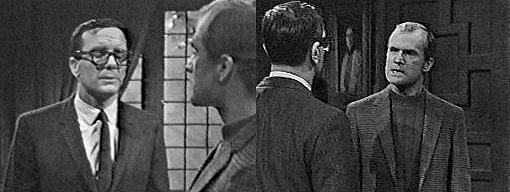
The point is, I don't believe you, says Roger. Vicki enters. Excuse me, she says, am I interrupting? Not at all, says Roger, I was just leaving--maybe Vicki can satisfy your curiosity--I certainly won't--and he turns and leaves the room. Guthrie sighs. It doesn't seem as if you've had much luck with Roger, says Vicki. No indeed, he says. What's your next move? She asks. I think Id' better get to know young David, he says. May I ask something of you? Vicki inquires. certainly, he says. If Roger doesn't stand in your way, she says, and you do get to know David, please be gentle with him. Guthrie assures her he will. You see, she says, he's been made a sort of pawn recently--he's a very sensitive boy, and very easily confused and hurt. I understand, he says. What do you want with him? she asks. There's obviously a deep psychic disturbance here, he says, now maybe David is part of it--I'd like a closer look. What are you going to do? she asks. Get him to go down to the Old House with me, says the doctor--I'd like to see what happens.
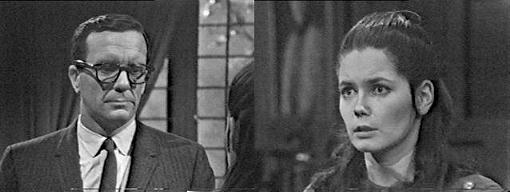
Be careful, warns Vicki--please be careful. He looks at her solemnly.
NOTES: Roger is being such an SOB! It's obvious that the fact that Liz put Carolyn in charge rather than him is pissing him off. He resents it--and the odd thing is, you can almost see maturity blossoming in Carolyn even as immaturity claims Roger. She doesn't seem the silly teen anymore, does she, now that Liz has put her in charge of everything? Perhaps she'll grow up as a result? I was cheering her on. She didn't lose her temper with her uncle and was acting in a far more an adult than he was. I think Liz believes the women got the best of everything in her family, and this was a rare, enlightened attitude in 1967.
Guthrie is moving in the right direction, but will Roger thwart his efforts, given how hateful he's behaving? Roger has refused to allow Guthrie to talk to Laura; could be possibly approve of him talking to David?
I can only imagine how much Guthrie wants to meet Josette! He's never seen a real ghost, but Vicki claims she has. Will his investigation eventually lead him to Laura, and if so, will he be able to put a halt to her shenanigans and save Liz? He seems a stalwart businessman, but shrewd, too.
Love, Robin